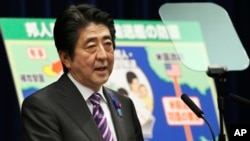Japan’s conservative government is making the most significant change in interpretation to its pacifist Constitution since the U.S.-written charter went into effect 67 years ago. That is generating a mixed reaction at home and abroad, especially in the countries that suffered from brutal Japanese colonialism in the first half of the 20th century.
Japanese Prime Minister Shinzo Abe is defending his controversial push to reinterpret the war-renouncing Article 9 of the Constitution.
Under the new rules approved by the Cabinet Tuesday, Japan's military would be allowed to exercise the right to "collective self-defense."
Speaking with reporters Tuesday, Abe said there has been a misunderstanding that the changes will mean Japan could become engulfed in war to help other countries.
The Japanese prime minister says the reinterpretation of the 1947 Constitution in no way changes its norms, rather is “about the minimum necessary measures for our self defense.”
China immediately expressed concern.
Foreign Ministry spokesman Hong Lei says Beijing opposes Tokyo’s move of “deliberately fabricating a China threat so as to serve a domestic political purpose.”
Hong said Japan must respect its neighbors’ security concerns, not harm China’s national sovereignty and security and not damage regional peace and stability.
This week, demonstrators launched protests in both Tokyo and Seoul to express opposition to the loosening of restrictions on Japan’s Self-Defense Forces.
A crowd, estimated at between 10,000 and 40,000 people, on Monday evening assembled in front of the prime minister’s office in Tokyo.
Some carried signs equating Abe with Nazi Germany’s Adolf Hitler. Others exhorted the Japanese leader not to “destroy” the constitution.
Among those joining the protest was Jinishiro Motoyama of Students Against Secret Protection Law. The university student expressed concern the prime minister’s decision could be the first step on the path back to Japanese militarism.
“This is a significant change in the Japanese history. It’s not a good way or a clever way to go…" Motoyama said. "If Mr. Abe changes Article 9 we can’t imagine what is going [to go] on with the next Cabinet or in the future.”
The protest occurred a day after a middle-aged man set himself on fire (and survived) outside a busy Tokyo railway station after shouting opposition to the change.
On Tuesday, dozens of South Koreans gathered in front of the Japanese embassy in Seoul.
They called for the Japanese prime minister to scrap lifting the ban on collective self defense.
Some other South Koreans say a more cautious reaction is prudent.
Political science professor Park Hwee-rhak at Kookmin University in Seoul is one of them. He notes South Korea and Japan are in an “indirect alliance” because both host U.S. military bases intended to defend the two Asian neighbors. He says this means Seoul would need to cooperate with Tokyo if there is an attack on the South by North Korea.
Thus, Park said, South Korea “should not view Japan’s decision too emotionally.” In exchange for recognizing Japan’s right of collective self-defense, South Korea, he said, “should receive Japan’s promise that it will not adopt policies of militarism or territorial expansion in the future.”
After the Cabinet’s decision in Tokyo, South Korea’s foreign ministry spokesman Noh Kwang-il told reporters that any Japanese exercise of collective self defense affecting security and national interests on the Korean peninsula “cannot be accepted unless we request it or agree to it.”
Jeffrey Hornung, an associate professor at the Asia-Pacific Center for Security Studies in Hawaii, says the new interpretation by Japan’s government will be especially welcomed at the Pentagon.
“The U.S. is going to welcome this, definitely, given that the U.S., for a long time, has wanted more out of its Japanese ally," Hornung said.
If Japanese lawmakers agree, the Cabinet’s move will allow Japan’s armed forces to rescue foreign troops or United Nations’ personnel conducting peacekeeping operations if attacked. And Japanese forces would be able to expand the use of their weapons. But the government says the modification still will not permit dispatching Japanese troops to combat zones.
The changes will have to be approved by a simple majority in both houses of Japan’s parliament. The governing Liberal Democratic Party enjoys a comfortable majority in the more powerful lower house and controls the upper chamber with the support of a coalition partner.
Public opinion polls commissioned by Japanese media in the past week indicate at least half of the domestic population oppose a more assertive military stance.
The left-of-center Asahi Shimbun says such a significant shift should occur through a formal amendment to the constitution, not based on a changing interpretation by the government. It calls Abe’s approach “theater of the absurd.”
The China Daily, in an editorial last month, said “countries in the region should be vigilant against Abe’s moves as Japan is the only Asian country that has inflicted tremendous harm on its neighbors with its military aggression before and during World War II.”
Tuesday marks the 60th anniversary of the establishment of the Self Defense Forces, which replaced the defeated Imperial Japan military disbanded by the victorious Allied forces.
Victor Beattie in Washington, Youmi Kim in Seoul and Shannon Van Sant in Beijing contributed to this report






